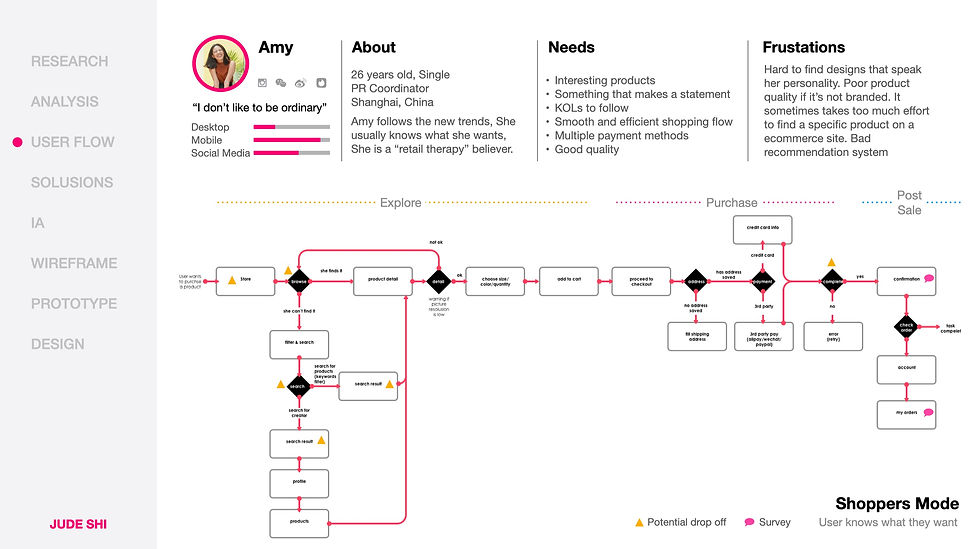Main Design Marketplace Case Study
- Jude Shi

- Jul 22, 2021
- 3 min read

BACKGROUND
Year: 2014-2015
Company: Studio Waffles
Project: A make over of the existing feature
What is Main Design
Social Media Photo Editing E-commerce
Main Design is a picture sharing social media mobile app, which helps designers who want to showcase their design works to gain recognition, as well as for the design enthusiasts to explore for design inspirations. With a print-on-demand service, Main Design also helps designers to make a profit from their design works by making them into tangible products and sell in Main Design Store.

Context
Main Design was launched in early 2015, it got a healthy and steady traffic growth ever since. As the main income source of the company, Main Design Store plays an extremely important role in the business model.
Problem
Despite its high daily visit and steady user growth, the abandonment rate was extremely high in Main Design Store.
Goal
Improve user experience in order to attract new customers and increase the conversion rate.
Users
WHO ARE THEY?
Age: 17 - 32
Gender: Male and female
Education: Studying, Degree
Hobby: Design, photography, fashion, meme, music, comic, travel, online shopping
WHAT DO TEHY WANT?
Unique Design
Good Products
Profit
Showcase Creativty
Design Inspirations
Gain Followings
Two-Sided Online Marketplace Platform

Sellers
Artists
Graphic designers
Photographers
Celebrities/KOLs
Agencies/Brands
Buyers
Experimenters
Enthusiasts
Printers
Fans
Advocates
Role & Responsibilities
I was the UI/UX Designer at Studio Waffles, where I was responsible for the design of Main Design, to incorporate interaction design and to bring more users to the app.
Setting goals and objectives
Creating scenarios
Creating user journeys and stories
Creating information architecture
Conducting UX research
Conducting competitive research
Low-fidelity prototypes
High fidelity prototypes
Creating wireframes
High-fidelity design
Usability testing
Process

01 Learn. Gain knowledge of users, context, technologies, gather user data,
research competitive products, conduct interviews and filed studies.
02 Explore. Build user profiles on gathered data, produce materials that will aid the outlining
of the project, task flows, user journeys, scenarios.
03 Select. Evaluate, test, and select wireframe concepts for prototype development.
04 Develop. Create design specifications and evolve concept/ wireframes into full design solution.
05 Refine. Evaluate design with stakeholders to obtain feedback and conduct usability testing.
06 Deliver. Complete design and produce deliverables.

Watching users try to accomplish tasks on our product is the most effective and efficient way to uncover usability problems.

In order to be competitive, we need to know what’s out there and what has worked
and has not worked. To connect the dots, you first need to collect the dots. Doing solid
investigative market research is essential for building a successful product.


I synthesized my personas from observations, research and stakeholder interviews.
To create a thorough persona I normally include social and demographic characteristics,
needs, desires, goals, habits, expertise, cultural background and motivations.
User journeys are useful in demonstrating the way users could interact with the
product, in this particular case I illustrated the series of steps necessary
for the user to take in order to collect different types of data.

In order to make good decision about both design and implementation I need
data about how people use designs, and the only way of gathering this data is
through usability testing.

Once I’ve completed the personas and user journeys, I’ll create the IA. It visualises
what I’ve have learnt about how users navigate the product, what sort of content they will
need to support them in their goals and what sort of language they use to identify things

I built high fidelity wireframes and fully annotated diagrams, having a basis to begin
creating screens; I also use them for user testing and as a reference point for functional
specifications and communicating the functionality I am going to build with stakeholders.
A wireframe specifically focuses on space allocation and prioritization of content, functionalities available, and intended behaviors, it allows you to determine the information hierarchy of the design while making it easier to plan out the content and user experience.
I made use of user testing to explore potential solutions during the design process
or test the waters during the product design cycle.

Having a background in design I love getting my hands dirty and producing the final high quality visual designs as well as the guidelines and specification. I’m allways up-to-date
with the latest industry trends and I also have a passion for design innovation.
Visual design maximizes the aesthetic, information-conveying capabilities of graphics and text. It’s actually a sub-discipline within the UX process, contributing to UI Design, information design, and graphic design.
OUTCOME
Abandonment rate was decreased to under 70%
NPS score was increased
The satisfaction rate was significantly increased
With the new design, Main Design was able to secure some major collaborations with some world-class brands, like Beats and Pepsi
A great number showed brand engagement and loyalty on social media
Without credible UX success measurements, we all risk not being able to quantify our
success. Without credible UX success measurements, we are unable to align our efforts to
an organization’s business objectives and desired outcomes.










Comments